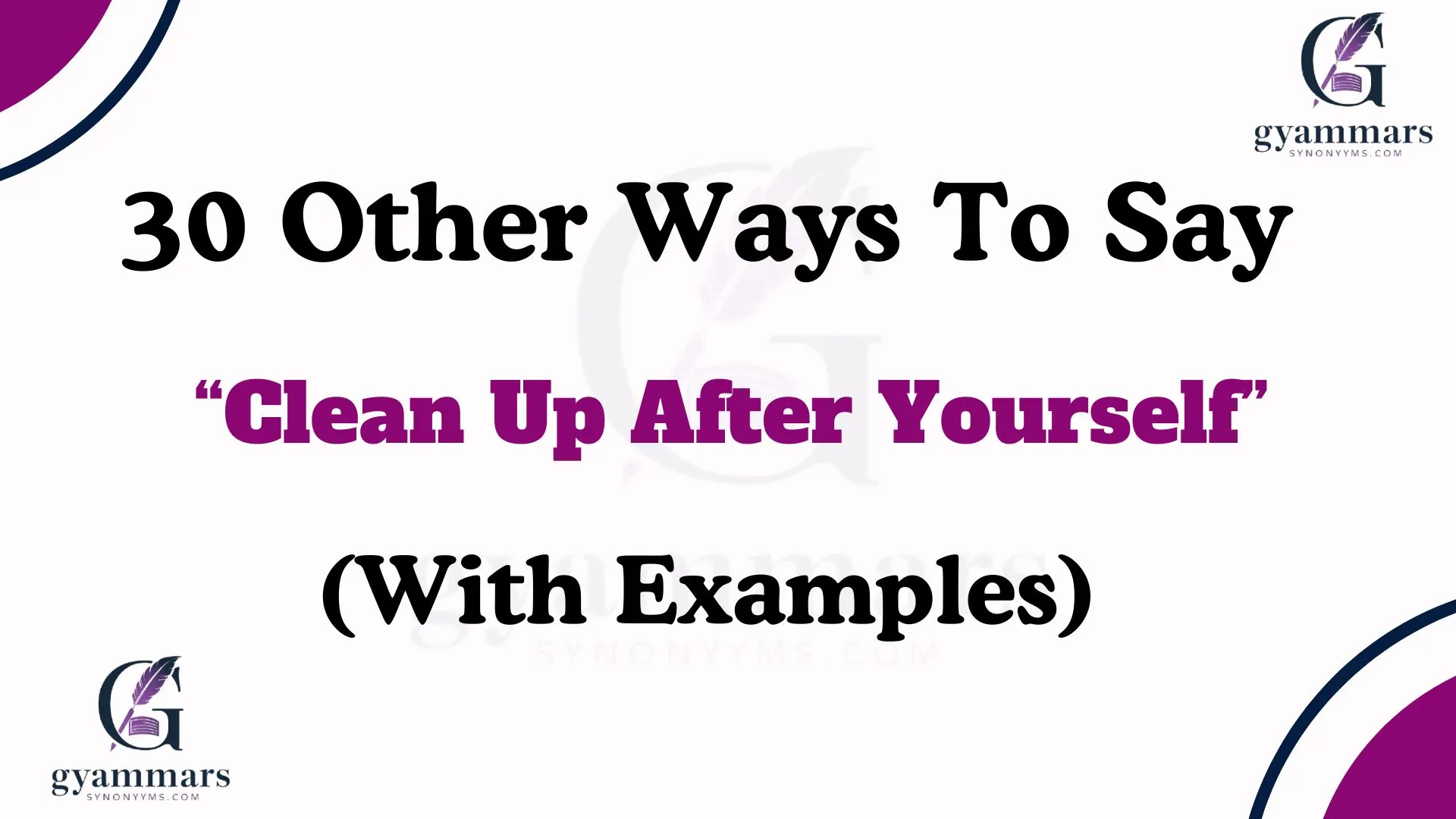Finding the right words matters, especially when asking someone to clean up after themselves. Whether you’re addressing a child, a roommate, a colleague, or a guest, the way you phrase your request can make all the difference. Instead of sounding bossy or harsh, you can use warm, thoughtful, and encouraging language to foster responsibility while maintaining kindness.
This guide provides 30 alternative ways to say “clean up after yourself,” helping you express yourself with care and clarity.
What Does “Clean Up After Yourself” Mean?
The phrase “clean up after yourself” means taking responsibility for the mess or items you have used. It applies to personal spaces like a home, office, classroom, or public area where individuals are expected to maintain cleanliness after themselves.
This phrase promotes responsibility, respect, and order, ensuring that shared spaces remain tidy for everyone.
Is It Professional/Polite to Say “Clean Up After Yourself”?
Yes, “clean up after yourself” is generally polite and neutral. However, in certain situations, it may come across as too direct or demanding.
- Professional Settings – It may be better to use a more formal alternative, such as “Please maintain cleanliness in shared spaces.”
- Casual Settings – It’s perfectly acceptable among friends, family, or roommates, but a gentler approach might be more effective.
- For Children – Softer phrases like “Let’s keep our space clean” work better than direct commands.
Choosing the right tone can help ensure your message is received positively.
Pros and Cons of Saying “Clean Up After Yourself”
Pros
- Direct and clear – Everyone understands what is expected.
- Encourages responsibility – Reinforces accountability.
- Works in various settings – Can be used at home, work, or school.
Cons
- Might sound demanding – Some may perceive it as a command.
- Lacks warmth – Can feel impersonal.
- Not always suitable for professional settings – May need a more polished alternative.
Synonyms For “Clean Up After Yourself”
- Please tidy up after yourself.
- Kindly keep the area clean.
- Please pick up after yourself.
- Let’s keep our space neat.
- Make sure to clean up when you’re done.
- Please leave things the way you found them.
- Do your part to keep things clean.
- Let’s all help maintain a clean space.
- Take a moment to tidy up.
- Keep the space as you’d like to find it.
- Be considerate and clean up after yourself.
- Remember to pick up after yourself.
- A clean space is a happy space—let’s keep it that way.
- Help us keep the area clean and organized.
- Please be responsible for your own mess.
- Let’s work together to keep things tidy.
- Take responsibility for your space.
- Respect shared spaces—clean up when you’re done.
- A little effort keeps things nice for everyone.
- Don’t forget to tidy up before leaving.
- Keep your space clean as a courtesy to others.
- Let’s maintain a clean and welcoming environment.
- Do your part in keeping this space clean.
- Keep things neat for the next person.
- Be mindful of cleanliness—please tidy up.
- Take pride in keeping the area clean.
- Show consideration by cleaning up after yourself.
- Cleanliness is kindness—help keep this place neat.
- Leave no trace—tidy up before you go.
- Your help in keeping things clean is appreciated.
1. Please Tidy Up After Yourself
Definition: A polite request to keep an area clean after using it.
Detailed Explanation: Encourages responsibility while maintaining a warm tone.
Scenario Example: “Hey team, let’s all tidy up after ourselves to keep the space looking nice!”
Best Use: Workplaces, schools, and homes.
Tone: Polite and encouraging.
Additional Notes: Works well for friendly reminders without sounding demanding.
2. Kindly Keep the Area Clean
Definition: A request for maintaining cleanliness.
Detailed Explanation: Often used in shared spaces to promote hygiene and order.
Scenario Example: “We appreciate your help in keeping the office tidy. Kindly keep the area clean after use.”
Best Use: Offices, shared kitchens, and public spaces.
Tone: Formal and respectful.
Additional Notes: Works well in professional environments.
3. Please Pick Up After Yourself
Definition: A request to ensure one’s personal mess is cleaned.
Detailed Explanation: A slightly more personal way to remind someone to clean.
Scenario Example: “Before you leave, please pick up after yourself so we can keep things organized.”
Best Use: Homes, schools, and casual settings.
Tone: Friendly and considerate.
Additional Notes: Can be softened by adding “please” for politeness.
4. Let’s Keep Our Space Neat
Definition: A collaborative way to encourage cleanliness.
Detailed Explanation: Uses inclusive language to make the request feel like a shared responsibility.
Scenario Example: “Hey everyone, let’s keep our space neat so it’s enjoyable for all!”
Best Use: Group settings like offices, classrooms, and shared spaces.
Tone: Motivational and positive.
Additional Notes: Works well to build teamwork and community effort.
5. Make Sure to Clean Up When You’re Done
Definition: A friendly reminder to clean after finishing an activity.
Detailed Explanation: Direct yet casual and polite.
Scenario Example: “Please make sure to clean up when you’re done so we can keep the area ready for others.”
Best Use: Workplaces, kitchens, and casual settings.
Tone: Encouraging and instructive.
Additional Notes: Great for reminders without being too firm.
6. Please Leave Things the Way You Found Them
Definition: Encourages people to restore order after using a space.
Detailed Explanation: Focuses on respect for shared environments.
Scenario Example: “Before you go, please leave things the way you found them so everyone can enjoy a clean space.”
Best Use: Libraries, offices, and shared areas.
Tone: Gentle and courteous.
Additional Notes: Helps reinforce community responsibility.
7. Do Your Part to Keep Things Clean
Definition: Encourages shared responsibility for cleanliness.
Detailed Explanation: This phrase shifts the focus to a team effort, making it feel less like an individual obligation.
Scenario Example: “We all enjoy a clean space—do your part to keep things clean!”
Best Use: Group environments like workplaces, classrooms, or public areas.
Tone: Motivational and community-focused.
Additional Notes: Works well in posters or reminders in shared spaces.
8. Let’s All Help Maintain a Clean Space
Definition: Promotes collaborative effort in cleanliness.
Detailed Explanation: Uses inclusive language to make cleaning feel like a group effort rather than a demand.
Scenario Example: “Hey team, let’s all help maintain a clean space so we can work comfortably.”
Best Use: Offices, shared kitchens, and classrooms.
Tone: Encouraging and supportive.
Additional Notes: A great way to foster teamwork and responsibility.
9. Take a Moment to Tidy Up
Definition: A gentle reminder to clean up without pressure.
Detailed Explanation: This phrase makes cleaning feel like a small, quick task rather than a chore.
Scenario Example: “Before you leave, take a moment to tidy up your space.”
Best Use: Casual settings, workspaces, and homes.
Tone: Soft and considerate.
Additional Notes: Great for non-confrontational reminders.
10. Keep the Space as You’d Like to Find It
Definition: Encourages people to think about others when leaving a space.
Detailed Explanation: Promotes mutual respect by asking people to consider how they’d feel entering a messy or clean area.
Scenario Example: “Before you leave, keep the space as you’d like to find it for the next person.”
Best Use: Libraries, office spaces, and public restrooms.
Tone: Thoughtful and respectful.
Additional Notes: Helps reinforce the Golden Rule in cleanliness.
11. Be Considerate and Clean Up After Yourself
Definition: Reminds others to respect shared spaces.
Detailed Explanation: A polite way to link cleanliness with thoughtfulness.
Scenario Example: “Let’s all be considerate and clean up after ourselves so everyone enjoys a tidy space.”
Best Use: Community areas, break rooms, and schools.
Tone: Warm and courteous.
Additional Notes: Works well in verbal reminders or posted signs.
12. Remember to Pick Up After Yourself
Definition: A friendly way to reinforce a cleanliness habit.
Detailed Explanation: Helps people form positive routines for maintaining clean spaces.
Scenario Example: “Before heading out, remember to pick up after yourself!”
Best Use: Casual and home settings.
Tone: Gentle and encouraging.
Additional Notes: Works well for kids, students, or casual workspaces.
13. A Clean Space is a Happy Space – Let’s Keep It That Way
Definition: Uses a positive spin to encourage cleaning.
Detailed Explanation: Connects cleanliness with happiness to make it feel rewarding.
Scenario Example: “A clean space is a happy space—let’s keep it that way by tidying up!”
Best Use: Schools, offices, and shared kitchens.
Tone: Lighthearted and motivational.
Additional Notes: Makes the cleaning process feel fun rather than tedious.
14. Help Us Keep the Area Clean and Organized
Definition: Calls for cooperation in maintaining cleanliness.
Detailed Explanation: Encourages people to see cleaning as a shared effort rather than an individual responsibility.
Scenario Example: “Before leaving, help us keep the area clean and organized by putting things back in place.”
Best Use: Community spaces, break rooms, and event venues.
Tone: Respectful and inviting.
Additional Notes: Works well in formal and informal settings.
15. Please Be Responsible for Your Own Mess
Definition: Highlights personal accountability for cleanliness.
Detailed Explanation: Encourages ownership of one’s mess without being harsh.
Scenario Example: “We all share this space, so please be responsible for your own mess.”
Best Use: Workplaces, classrooms, and public facilities.
Tone: Firm yet polite.
Additional Notes: Best used when setting expectations for new team members or students.
16. Let’s Work Together to Keep Things Tidy
Definition: Encourages a team effort in maintaining cleanliness.
Detailed Explanation: Shifts the focus from individual responsibility to community cooperation.
Scenario Example: “To keep the space welcoming, let’s work together to keep things tidy.”
Best Use: Team environments, co-working spaces, and family homes.
Tone: Friendly and inclusive.
Additional Notes: Great for building a sense of responsibility without pressure.
17. Take Responsibility for Your Space
Definition: Encourages personal accountability for cleanliness.
Detailed Explanation: This phrase asks individuals to own their space and be mindful of how they leave it.
Scenario Example: “We all share this room, so please take responsibility for your space.”
Best Use: Workspaces, classrooms, and co-living situations.
Tone: Firm yet considerate.
Additional Notes: Helps set clear expectations for shared spaces.
18. Respect Shared Spaces – Clean Up When You’re Done
Definition: Links cleaning with mutual respect.
Detailed Explanation: Encourages people to consider others who will use the space after them.
Scenario Example: “Please respect shared spaces—clean up when you’re done so everyone can enjoy a tidy area.”
Best Use: Common areas like office kitchens, gyms, and libraries.
Tone: Polite and community-oriented.
Additional Notes: Works well for public or professional settings.
19. A Little Effort Keeps Things Nice for Everyone
Definition: Highlights how small actions contribute to a clean environment.
Detailed Explanation: Reminds people that even minor cleaning efforts can make a big difference.
Scenario Example: “Just a quick wipe-down and putting things back in place—a little effort keeps things nice for everyone!”
Best Use: Homes, schools, and break rooms.
Tone: Encouraging and positive.
Additional Notes: Great for motivating kids or teams to clean.
20. Don’t Forget to Tidy Up Before Leaving
Definition: A simple reminder to clean up after using a space.
Detailed Explanation: This phrase makes tidying up feel like a routine step before leaving a space.
Scenario Example: “It’s been a great meeting! Don’t forget to tidy up before leaving.”
Best Use: Meetings, classrooms, and rented spaces.
Tone: Gentle and non-confrontational.
Additional Notes: Ideal for situations where people rotate through spaces.
21. Keep Your Space Clean as a Courtesy to Others
Definition: Links cleanliness to thoughtfulness.
Detailed Explanation: Encourages people to think beyond themselves and keep spaces tidy for others who will use them next.
Scenario Example: “Please keep your space clean as a courtesy to others who will be here after you.”
Best Use: Public areas, offices, and libraries.
Tone: Respectful and polite.
Additional Notes: Works well for posters or emails in shared spaces.
22. Let’s Maintain a Clean and Welcoming Environment
Definition: Encourages cleanliness for everyone’s benefit.
Detailed Explanation: This phrase shifts focus from individual actions to collective well-being.
Scenario Example: “To keep our workplace inviting, let’s maintain a clean and welcoming environment.”
Best Use: Community centers, offices, and restaurants.
Tone: Inclusive and friendly.
Additional Notes: Ideal for team-oriented settings.
23. Do Your Part in Keeping This Space Clean
Definition: Promotes shared responsibility.
Detailed Explanation: Suggests that everyone plays a role in maintaining cleanliness.
Scenario Example: “This is a shared space—please do your part in keeping it clean.”
Best Use: Office spaces, public restrooms, and cafes.
Tone: Cooperative and encouraging.
Additional Notes: Works well for spaces where many people pass through daily.
24. Keep Things Neat for the Next Person
Definition: Encourages thoughtfulness for others who will use the space next.
Detailed Explanation: Helps people recognize that their actions impact others.
Scenario Example: “Before you leave, keep things neat for the next person!”
Best Use: Bathrooms, shared desks, and changing rooms.
Tone: Thoughtful and polite.
Additional Notes: Great for rotating workspaces or shared facilities.
25. Be Mindful of Cleanliness – Please Tidy Up
Definition: Reminds people to be aware of their surroundings and maintain cleanliness.
Detailed Explanation: Encourages mindful behavior rather than just following rules.
Scenario Example: “We love a neat space, so be mindful of cleanliness—please tidy up.”
Best Use: Common areas in offices, classrooms, and waiting rooms.
Tone: Gentle yet firm.
Additional Notes: Helps instill long-term cleanliness habits.
26. Take Pride in Keeping the Area Clean
Definition: Encourages a sense of responsibility and pride in cleanliness.
Detailed Explanation: This phrase reframes cleaning as something positive and valuable rather than a chore.
Scenario Example: “We appreciate everyone’s efforts—take pride in keeping the area clean!”
Best Use: Schools, offices, and group settings.
Tone: Motivational and positive.
Additional Notes: Ideal for team-oriented messages.
27. Show Consideration by Cleaning Up After Yourself
Definition: Links cleaning to kindness and respect.
Detailed Explanation: Reinforces that cleaning up is a way to show care for others.
Scenario Example: “We share this space, so please show consideration by cleaning up after yourself.”
Best Use: Cafeterias, office break rooms, and rental properties.
Tone: Thoughtful and considerate.
Additional Notes: A great way to promote kindness through small actions.
28. Cleanliness is Kindness – Help Keep This Place Neat
Definition: Equates cleanliness with kindness to make it feel more rewarding.
Detailed Explanation: Encourages cleaning as an act of goodwill rather than a duty.
Scenario Example: “Cleanliness is kindness—help keep this place neat for everyone to enjoy!”
Best Use: Public spaces, offices, and homes.
Tone: Warm and inviting.
Additional Notes: Helps create a positive culture around cleanliness.
29. Leave No Trace – Tidy Up Before You Go
Definition: Encourages leaving a space exactly as it was found (or better).
Detailed Explanation: This phrase, often used in outdoor settings, applies well to any shared space.
Scenario Example: “Before heading out, leave no trace—tidy up before you go.”
Best Use: Camping sites, offices, and co-working spaces.
Tone: Polite and firm.
Additional Notes: Ideal for eco-conscious messaging.
30. Your Help in Keeping Things Clean is Appreciated
Definition: Expresses gratitude while encouraging cleanliness.
Detailed Explanation: Reinforces the idea that everyone’s efforts contribute to a clean space.
Scenario Example: “Your help in keeping things clean is appreciated! Thank you for tidying up after yourself.”
Best Use: Anywhere that needs a friendly cleaning reminder.
Tone: Appreciative and encouraging.
Additional Notes: Best for reminders with a positive and grateful tone.
Final Thoughts
Using empathetic and thoughtful language when asking someone to clean up can make the difference between cooperation and resistance. Instead of making cleanliness feel like a chore or demand, these 30 alternatives help promote a culture of respect and responsibility in homes, workplaces, and public spaces.
By choosing words that convey warmth, encouragement, and shared responsibility, you can inspire others to keep spaces neat without sounding harsh or demanding.
A clean space is a happy space—let’s all do our part to keep it that way! 😊
FAQs
1. Why is it important to use alternative phrases for “Clean Up After Yourself”?
Using thoughtful and warm phrasing encourages cooperation and avoids sounding demanding or rude. People respond better to positive, respectful language rather than commands.
2. Which alternative phrase is best for a workplace setting?
Phrases like “Respect shared spaces – clean up when you’re done” or “Let’s maintain a clean and welcoming environment” work well in offices. They sound professional and inclusive while promoting responsibility.
3. What’s a polite way to ask guests to clean up after themselves?
Try “We appreciate your help in keeping things tidy” or “Please leave the space as you found it” to make your request kind and non-confrontational.
4. How can I encourage kids to clean up after themselves?
Use fun and engaging phrases like “A little effort keeps things nice for everyone” or “Take pride in keeping your space clean”. Making cleaning feel like teamwork also helps.
5. Is it rude to tell someone to clean up?
It depends on your tone and wording. Instead of saying, “You need to clean up!”, try “Let’s keep this space nice for everyone” to encourage responsibility without being harsh.

“Mia Rose at Grammar Synonyms is your ultimate guide to mastering language with style and precision. Whether you’re looking to enhance your vocabulary, perfect your grammar, or discover the ideal synonym, Mia Rose offers expert resources and creative solutions to help you express yourself flawlessly. With Grammar Synonyms, unlock a world of language possibilities and elevate every piece of writing you create.












